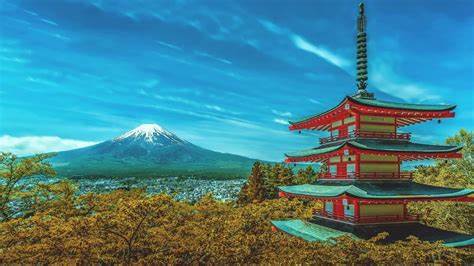Japan, a land where ancient traditions coexist with cutting-edge innovation, continues to captivate travelers seeking a multifaceted experience. From the serene temples of Kyoto to the neon-lit streets of Tokyo, Japan offers a unique opportunity to explore both its rich cultural heritage and its futuristic advancements. As travelers become more conscious of their environmental footprint, Japan is stepping up with a commitment to sustainability, making it an ideal destination for responsible tourism. Whether you’re hiking through ancient forests, soaking in hot springs, or experiencing Japan’s innovative technology, this island nation is redefining the way we travel.
Sustainable Tourism in Japan: Preserving Nature and Culture
Sustainability is becoming a core value in Japan’s tourism industry, as both the government and local businesses prioritize eco-friendly practices. Japan’s commitment to sustainability is evident in its pristine natural landscapes, which are carefully protected and preserved. National parks like the Japanese Alps, Mount Fuji, and the iconic Nara Park are not only natural treasures but also showcase Japan’s dedication to preserving its environment.
In recent years, the rise of eco-tourism has transformed how people experience Japan’s natural beauty. Travelers can participate in guided hikes that emphasize conservation, wildlife protection, and the importance of preserving traditional farming methods. For example, in the rural areas of Hida, visitors can stay at eco-lodges that use renewable energy, farm organically, and support local artisans. These experiences help travelers engage with Japan’s rural culture while minimizing their environmental impact.
One of the more unique sustainable initiatives in Japan is the movement toward “low-impact” travel in rural villages. These villages, such as the Gassho-zukuri villages in Shirakawa-go, encourage tourists to stay in traditional thatched-roof houses and learn about the region’s efforts to maintain its historic architecture while embracing green practices. This type of tourism helps preserve local heritage while benefiting the community through eco-conscious travel.
The Culinary Journey: Sustainable and Authentic Japanese Cuisine
Japanese cuisine is internationally renowned for its refinement, artistry, and emphasis on fresh, local ingredients. Food tourism has exploded in Japan, and travelers are flocking to the country to experience its culinary heritage firsthand. From sushi in Tokyo to ramen in Sapporo, Japanese food is an essential part of the travel experience, and sustainability plays an increasing role in how it is produced and consumed.
In places like Kyoto, travelers can engage in farm-to-table dining experiences that emphasize the use of local, seasonal ingredients. Many of Japan’s high-end restaurants, such as those in Tokyo and Osaka, are turning to sustainable seafood practices and supporting small-scale, organic farming. The popularity of plant-based and vegetarian dining options is also growing in Japan, with a focus on miso, tofu, and seasonal vegetables, offering a taste of Japan’s healthy and eco-friendly cuisine.
A particularly unique culinary experience in Japan is learning to make traditional dishes like sushi, tempura, and mochi through cooking classes. In addition to teaching essential cooking techniques, these classes often include a focus on using fresh, local, and sustainable ingredients. Many restaurants and cooking schools also offer insight into the preservation of Japan’s food traditions, from the art of preserving fish to making pickled vegetables that have been passed down through generations.
Cultural Immersion: A Deep Dive into Japan’s Heritage
Japan is a country where tradition is deeply respected and celebrated. Travelers seeking cultural immersion can engage with the country’s rich history through its many temples, shrines, and traditional art forms. Kyoto, known as the cultural capital, offers countless opportunities to experience Japan’s timeless heritage. From tea ceremonies to kimono-wearing experiences, visitors can step back in time and participate in traditions that have been passed down for centuries.
In addition to its well-known temples and shrines, Japan’s smaller towns offer a more intimate connection to the country’s culture. Towns like Kanazawa and Takayama offer preserved Edo-era streets, traditional merchant houses, and local festivals that have been celebrated for hundreds of years. Here, travelers can learn about Japan’s history through hands-on experiences, whether it’s making paper in the traditional washi style or visiting a local pottery workshop to learn about Japanese ceramics.
The cultural richness of Japan extends beyond its historical sites to its festivals. Traditional celebrations such as the Gion Matsuri in Kyoto and the Awa Odori in Tokushima showcase the country’s vibrant culture through dance, music, and processions. These festivals not only provide an exciting cultural experience but also highlight Japan’s dedication to preserving its rich traditions while embracing the modern world.
Wellness in Japan: Rejuvenating Mind and Body with Nature’s Healing Touch
Japan has long been recognized for its focus on wellness and holistic health practices. The country’s wellness tourism is booming, particularly in the areas of hot spring bathing, meditation, and mindfulness. The Japanese concept of “wabi-sabi” — finding beauty in imperfection — encourages visitors to slow down, connect with nature, and appreciate the present moment. This philosophy is embedded in Japan’s wellness offerings, making it a perfect destination for travelers seeking relaxation and rejuvenation.
Onsen (hot springs) are among the most sought-after wellness experiences in Japan. Soaking in mineral-rich waters surrounded by tranquil nature has been a traditional Japanese practice for centuries. Popular onsen resorts in Hakone, Beppu, and Ibusuki offer visitors the chance to relax in natural hot springs while enjoying the stunning scenery of mountains, forests, and beaches. Some onsen are located in remote areas, providing an idyllic escape where travelers can unwind, disconnect, and focus on self-care.
In addition to hot springs, Japan offers unique wellness experiences such as forest bathing, or “shinrin-yoku,” a practice that encourages immersion in the natural environment for physical and mental well-being. In Japan’s forests, visitors are encouraged to slow down, breathe deeply, and take in the natural surroundings. This practice has been shown to reduce stress, lower blood pressure, and improve overall health, making it an ideal way to reconnect with nature in a fast-paced world.
Japan’s wellness offerings also extend to the practice of meditation and mindfulness. Many temples across the country offer meditation retreats, where visitors can learn about Zen practices and deepen their understanding of Japanese spirituality. These retreats provide an opportunity for quiet reflection, inner peace, and self-discovery in a peaceful and serene setting.
Innovative Travel: Embracing Technology in the Land of the Future
Japan is famous for its technological advancements, and this innovation has reshaped the way travelers experience the country. From smart hotels to high-tech toilets, Japan integrates cutting-edge technology into its tourism industry to enhance the traveler experience. The country’s efficient transportation systems, such as the Shinkansen (bullet trains), allow travelers to move quickly and comfortably between cities while minimizing their environmental impact.
The rise of digital tourism has also transformed how visitors plan their trips. Many Japanese attractions and cities are offering virtual tours, augmented reality experiences, and mobile apps that enhance the visitor experience. In Tokyo, the digital art museum teamLab Borderless offers an immersive experience that blends art and technology in a captivating, interactive space.
Japan is also embracing sustainability in its technology-driven tourism, with smart solutions for waste management, energy efficiency, and eco-friendly transportation. Smart hotels are becoming popular, where guests can use apps to control room temperature, lighting, and other amenities, reducing energy consumption and waste.
Conclusion: Japan’s Harmonious Blend of Tradition and Innovation
Japan continues to captivate travelers with its seamless blend of rich traditions, advanced technology, and commitment to sustainability. Whether soaking in an onsen, savoring seasonal dishes, or exploring the temples of Kyoto, Japan offers an immersive experience that appeals to all types of travelers. As sustainability becomes an increasingly important aspect of tourism, Japan’s eco-conscious initiatives and dedication to preserving its culture and natural beauty ensure that it will remain a top destination for years to come. For those seeking an unforgettable journey that balances nature, innovation, and tradition, Japan is the ultimate destination.






